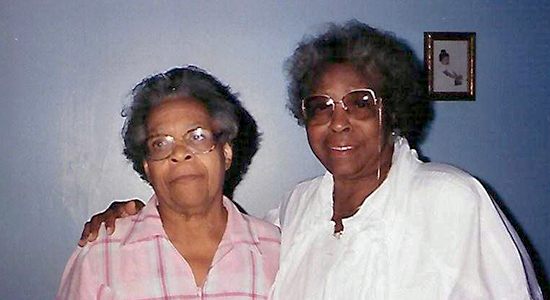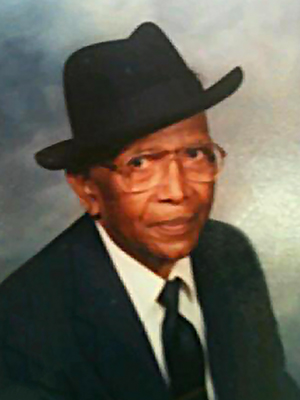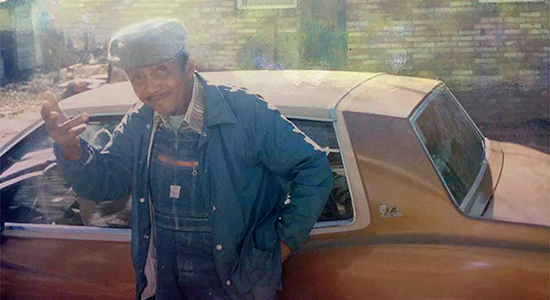
Grandmothers, from left, Grace Kay and Beatrice Tinnen, circa 1987. Grace inspired in Clyde an
appreciation of simplification, while Beatrice modeled empathy and compassion for others.
As a mentor to junior and aspiring attorneys, I often share my technical expertise and advice freely with those who ask.
However, upon reflection, I believe that I have been holding out on some of the most important lessons that have shaped me and how I practice law. I firmly believe that these principles are at the core of the success that I have enjoyed during my years in the legal profession.
These are tenets about professional behavior that I learned from my grandparents by observing and listening to them. Like all great teachers, my grandparents were practitioners of what they preached and their actions spoke volumes.
My grandparents did not have much formal education, but I am grateful for the lessons that they taught me simply by being the people that they were. I am hopeful that they will be beneficial for those who read this article, too.
The Sunday School Teacher: Simplification is Sometimes Necessary
My maternal grandmother, Grace Kay, was a homemaker and part-time seamstress. As a mother of nine children, she did not have much leisure time to call her own. She spent a lot of the free time that she did have volunteering in her church and serving as a dedicated teacher in the Sunday school program. It is hard for me to imagine when she could have possibly found the time to prepare for teaching each Sunday.
 Clyde Tinnen, Columbia 2006, is a partner with Greenwich, Conn.-based Withers LLP, located in its Brookfield offices. He focuses his practice on corporate law matters, including finance and securities law, banking, private equity, and mergers and acquisitions.
Clyde Tinnen, Columbia 2006, is a partner with Greenwich, Conn.-based Withers LLP, located in its Brookfield offices. He focuses his practice on corporate law matters, including finance and securities law, banking, private equity, and mergers and acquisitions.
She was a great teacher and known by many of the parishioners as a catalyst for their spiritual growth, including many future clergy. Her unique ability to untangle all of the complexity and depth of scripture and repackage that material in a manner that young children and teenagers could understand and internalize made all the difference in the world to her young students.
Grace’s greatest professional gift to me was an appreciation of simplification. She was able to relay bible stories in a fashion so that her students not only understood the stories, but perhaps more importantly, could apply the lesson to their own lives. Her ability to decipher intellectually and spiritually challenging matters for her students is very similar to the role that a good lawyer plays in advising clients.
Transactions, disputes, and interpretation of the law are generally filled with lots of complexity and nuance. A good lawyer understands these intricacies when conducting analysis, but before discussing the matter with the client, breaks it down into bite-sized, actionable pieces that the client can rely on to make informed decisions. This is intuitive to most attorneys; however, attorneys do forget on occasion, and offer advice that serves to confuse or frustrate clients.
The Nurse: Listen Closely to Clients
My paternal grandmother, Beatrice Tinnen, was a nurse. She specialized in caring for the elderly, initially in nursing homes and rehabilitation centers, and later in the homes of her patients.
Meet Our Contributors
Why do you do what you do? What's the best advice you ever received? Share your weirdest courtroom story...
Lawyers have a lot to say. Our authors are no exception. Whether its personal, insightful, or fun, it’s always interesting.
Check out our Q&A with the author below
Like so many in her profession, my grandmother was well-known for her empathy and compassion for her patients. Her ability to listen to her patients and pay special attention to nonverbal cues and details empowered her to anticipate the needs of her patients, sometimes solving problems or ailments for which symptoms had not even presented themselves. She cared for her patients’ well-being so deeply that she was obsessively careful not to skip steps or make errors in haste.
She offered comfort to families and provided companionship and dignity to many of her elderly patients who often felt alone and forgotten. Her work filled her with a great sense of purpose and determination, so much so that even when she was ill late in her life, she was the one who encouraged me to keep going through the extremely long hours of my first couple of years of practice, and implored me to always be grateful that I had the health and strength to work.
One of the most powerful skills that an attorney can develop is an ability to empathize with his or her clients. By listening carefully and feeling your client’s pain, your value to your client will be greatly enhanced. Placing oneself in the shoes of the client brings greater clarity and focus to analysis and can help lawyers tap into that special supply of energy and motivation that leads to better outcomes.
The Dairy Farmer: Approach Tasks Methodically

Grandfather Maurice Kay, circa 1980, embodied the value of hard work and
consistency.
My maternal grandfather, Maurice Kay, was a dairy farmer.
The life of a dairy farmer is marked by hard work and consistency. Cows do not take days off and, accordingly, neither do the people whose livelihood depends on them. He worked long hours prior to modern inventions that have improved some of the daily tasks of milking, feeding, and caring for the livestock. The farmer that he worked for also grew crops, a physically demanding job that requires faith that one’s hard work will not be for naught.
My grandfather was an early riser – he was more reliable than any rooster or alarm clock. He adhered strictly to his routines, always arrived early, and approached tasks methodically. Later in life, he left the farm to work as a laborer at a saw mill, until he retired late in life because of health issues.
The greatest lesson that I learned from Maurice was consistency. He was a quiet humble man but took great pride in the fact that those who counted on him, knew that they could count on him.
As a lawyer, there is no better way to foster trust in your colleagues and clients than to perform consistently. Approaching tasks methodically is one way to increase the likelihood that your work product consistently meets or exceeds expectations. Promptly returning emails and phone calls, using standard templates for agreements, and using checklists are all examples of consistency-inducing methods.
The Moonshiner: Invest in Learning New Things

Grandfather Haywood Tinnen, circa 1985, exemplified all that it means to be dynamic,
resourceful, and a lifelong learner.
My paternal grandfather, Haywood Tinnen, was a moonshiner during prohibition.
The 18th Amendment to the U.S. Constitution prohibited the manufacture, transport, and sale of alcohol. It was the 18th Amendment that drove the lucrative alcohol business underground, giving rise to a large and pervasive black market. Prohibition came to an end with the ratification of the 21st Amendment on Dec. 5, 1933.
In addition to the clear legal constraints on the business, Haywood and his partners had to come up with a recipe that would appeal to customer tastes, manage the safe production of alcohol in homemade distilleries (no small feat), and develop creative and faster ways to get their product to clients despite the relatively heavy load of transporting moonshine with the vehicles of the time. No pressure!
After his moonshine days were over, he worked as a tobacco farmer and landscaper.
Haywood exemplified all that it means to be dynamic and resourceful. Like so many of his generation that experienced two World Wars and the Great Depression, my grandfather was a man who was willing to learn anything (despite having only a third-grade education), and pushed all sorts of boundaries – all in an effort to make a living.
While I certainly would not recommend that any budding attorney break the law, I would encourage all attorneys to feed their curiosity about all sorts of law (even if their niche is very narrowly defined), and commit themselves to lifelong learning toward that end.
Lawyers are very fortunate in that the world and the law change all the time, creating new and exciting opportunities for lawyers to reinvent themselves. The legalization of cannabis and blockchain technology (cryptocurrency) are examples of outside forces that have created significant opportunities for attorneys willing to roll up their sleeves and invest the time to learn.
A Privilege: Learning from Those Before Us
It is a privilege to have a personal relationship with one’s grandparents and an even greater blessing to be guided and inspired by loving grandparents. I was fortunate enough to have four of the world’s very best grandparents, and although they are no longer living, their lives are shining examples of what I aim to be, both personally and professionally. I will forever be in their debt.
Meet Our Contributors
What was your most relaxing, eventful, or favorite vacation?
 My most relaxing vacation was a vacation to Jamaica earlier this year. We booked our vacation later than planned and wound up spending spring break in a beautiful mountain villa; however, internet and cell service was spotty in our area. I rarely get a chance to completely unplug and be inaccessible, but when I do, it is a stark reminder of how blurry the lines can get between a modern lawyer’s personal life and professional life. It took a while to get used to not glancing at my phone every few minutes, but once I did I really enjoyed the time away with my family.
My most relaxing vacation was a vacation to Jamaica earlier this year. We booked our vacation later than planned and wound up spending spring break in a beautiful mountain villa; however, internet and cell service was spotty in our area. I rarely get a chance to completely unplug and be inaccessible, but when I do, it is a stark reminder of how blurry the lines can get between a modern lawyer’s personal life and professional life. It took a while to get used to not glancing at my phone every few minutes, but once I did I really enjoyed the time away with my family.
Clyde Tinnen, Withers LLP, Brookfield.
Become a contributor! Are you working on an interesting case? Have a practice tip to share? There are several ways to contribute to Wisconsin Lawyer. To discuss a topic idea, contact Managing Editor Karlé Lester at (800) 444-9404, ext. 6127, or email klester@wisbar.org. Check out our writing and submission guidelines.
This article first appeared in the State Bar Business Law Section’s Business Law Blog on Sept. 25, 2017.
